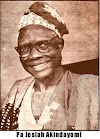2 Samuel 12: 23 "Then David said to Nathan, “I have sinned against the Lord.” Nathan replied, “The Lord has taken away your sin. You are not going to die."
I will never forget this phrase from our Lord Jesus Christ "It is not the healthy who need a doctor, but the sick. I have not come to call the righteous, but sinners to repentance." even to His death, Jesus saved a soul next to him on the cross in Luke 23:39-43 but one of them just because This second criminal knew his own sin (under the same condemnation . . . we indeed justly, for we receive the due reward of our deeds). He knew Jesus (this Man has done nothing wrong). He called out to Jesus (he said to Jesus, “Lord . . .”). He believed Jesus was who Jesus said He was (remember me when You come into Your kingdom). He believed the promise of everlasting life from Jesus.
I was watching a tv program and this gentle man said "If you don't repent you won't get forgiveness" this got me thinking and i can't but affirmed it as fact.
In 2 Samuel 12 "Then the Lord sent Nathan to David. And he came to him, and said to him: “There were two men in one city, one rich and the other poor. “The rich man had exceedingly many flocks and herds. But the poor man had nothing, except one little ewe lamb which he had bought and nourished; and it grew up together with him and with his children. It ate of his own food and drank from his own cup and lay in his bosom; and it was like a daughter to him. And a traveler came to the rich man, who refused to take from his own flock and from his own herd to prepare one for the wayfaring man who had come to him; but he took the poor man’s lamb and prepared it for the man who had come to him.”
So David’s anger was greatly aroused against the man, and he said to Nathan, “As the Lord lives, the man who has done this shall surely die! And he shall restore fourfold for the lamb, because he did this thing and because he had no pity.”
Then Nathan said to David, “You are the man!
Nathan did not ask David for a judicial decision, and David naturally assumed the story was true. David immediately passed sentence on the guilty man of Nathan’s story. David showed that we often try to rid our guilty consciences by passing judgment on someone else.
The idea is that the man should have had pity on his neighbor and did not. In the same way David should have had pity on Uriah and Bathsheba’s father and grandfather.
David’s confession is a good example. He placed the blame squarely on his own shoulders. He did not minimize his offence. David realized that he especially sinned against God.
“The words are very few, but that is a good sign of a thoroughly broken spirit. There is no excuse, no hiding, no concealment of the sin. There is no searching for a loophole, no pretext put forward, no human weakness pleaded. He acknowledged his guilt openly, candidly and without any denial of truth.”
-- David knew that he had to deal with his sin. David showed personal responsibility for his sin.
-- "Have sinned" David didn’t use elaborate or soft vocabulary. He sinned. It wasn’t a mistake, an error, a mess-up, an indiscretion, or a problem.
David more eloquently expressed his repentance in Psalm 51.
Have mercy upon me, O God, according to Your lovingkindness; according to the multitude of Your tender mercies, blot out my transgressions. Wash me thoroughly from my iniquity, and cleanse me from my sin. For I acknowledge my transgressions, and my sin is ever before me. Against You, You only have I sinned, and done this evil in Your sight – that You may be found just when You speak, and blameless when You judge. . . . For You do not desire sacrifice, or else I would give it; You do not delight in burnt offering. The sacrifices of God are a broken spirit, and a broken and contrite heart – these, O God, You will not despise. (Psalm 51:1-4; 16-17)
David’s awareness of sin, desire for cleansing, recognition of God’s righteous judgment, and understanding of what God wants are each clear in Psalm 51.
We know the rest of the but in conclusion: Many who live in either open or hidden sin seem to believe it has no effect or little effect on their relationship with God. But despising God’s commandment means despising God Himself, and we can’t have fellowship with God and despise Him at the same time. If we say that we have fellowship with Him, and walk in darkness, we lie and do not practice the truth. (1 John 1:6)
I will never forget this phrase from our Lord Jesus Christ "It is not the healthy who need a doctor, but the sick. I have not come to call the righteous, but sinners to repentance." even to His death, Jesus saved a soul next to him on the cross in Luke 23:39-43 but one of them just because This second criminal knew his own sin (under the same condemnation . . . we indeed justly, for we receive the due reward of our deeds). He knew Jesus (this Man has done nothing wrong). He called out to Jesus (he said to Jesus, “Lord . . .”). He believed Jesus was who Jesus said He was (remember me when You come into Your kingdom). He believed the promise of everlasting life from Jesus.
I was watching a tv program and this gentle man said "If you don't repent you won't get forgiveness" this got me thinking and i can't but affirmed it as fact.
In 2 Samuel 12 "Then the Lord sent Nathan to David. And he came to him, and said to him: “There were two men in one city, one rich and the other poor. “The rich man had exceedingly many flocks and herds. But the poor man had nothing, except one little ewe lamb which he had bought and nourished; and it grew up together with him and with his children. It ate of his own food and drank from his own cup and lay in his bosom; and it was like a daughter to him. And a traveler came to the rich man, who refused to take from his own flock and from his own herd to prepare one for the wayfaring man who had come to him; but he took the poor man’s lamb and prepared it for the man who had come to him.”
So David’s anger was greatly aroused against the man, and he said to Nathan, “As the Lord lives, the man who has done this shall surely die! And he shall restore fourfold for the lamb, because he did this thing and because he had no pity.”
Then Nathan said to David, “You are the man!
Nathan did not ask David for a judicial decision, and David naturally assumed the story was true. David immediately passed sentence on the guilty man of Nathan’s story. David showed that we often try to rid our guilty consciences by passing judgment on someone else.
The idea is that the man should have had pity on his neighbor and did not. In the same way David should have had pity on Uriah and Bathsheba’s father and grandfather.
David’s confession is a good example. He placed the blame squarely on his own shoulders. He did not minimize his offence. David realized that he especially sinned against God.
“The words are very few, but that is a good sign of a thoroughly broken spirit. There is no excuse, no hiding, no concealment of the sin. There is no searching for a loophole, no pretext put forward, no human weakness pleaded. He acknowledged his guilt openly, candidly and without any denial of truth.”
-- David knew that he had to deal with his sin. David showed personal responsibility for his sin.
-- "Have sinned" David didn’t use elaborate or soft vocabulary. He sinned. It wasn’t a mistake, an error, a mess-up, an indiscretion, or a problem.
David more eloquently expressed his repentance in Psalm 51.
Have mercy upon me, O God, according to Your lovingkindness; according to the multitude of Your tender mercies, blot out my transgressions. Wash me thoroughly from my iniquity, and cleanse me from my sin. For I acknowledge my transgressions, and my sin is ever before me. Against You, You only have I sinned, and done this evil in Your sight – that You may be found just when You speak, and blameless when You judge. . . . For You do not desire sacrifice, or else I would give it; You do not delight in burnt offering. The sacrifices of God are a broken spirit, and a broken and contrite heart – these, O God, You will not despise. (Psalm 51:1-4; 16-17)
David’s awareness of sin, desire for cleansing, recognition of God’s righteous judgment, and understanding of what God wants are each clear in Psalm 51.
We know the rest of the but in conclusion: Many who live in either open or hidden sin seem to believe it has no effect or little effect on their relationship with God. But despising God’s commandment means despising God Himself, and we can’t have fellowship with God and despise Him at the same time. If we say that we have fellowship with Him, and walk in darkness, we lie and do not practice the truth. (1 John 1:6)










0 Comments